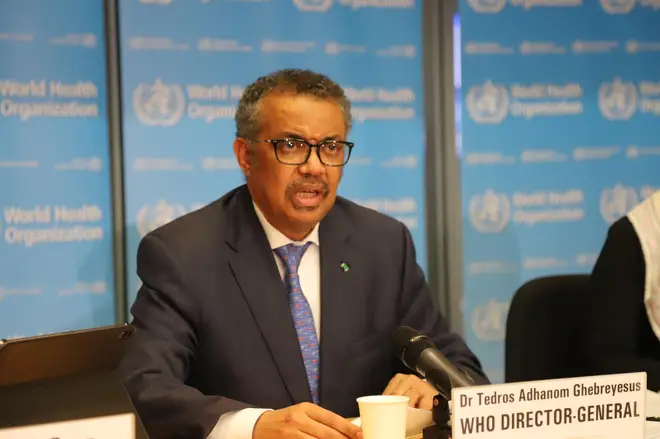
Nick Ferrari 7am - 10am
3 August 2020, 12:32

There "might never be" a "silver bullet" treatment for the coronavirus pandemic, according to the director-general of the World Health Organisation (WHO).
Dr Tedros Adhanom Ghebreyesus delivered a media briefing on Monday during which he said: "We learn every day about this virus and I'm pleased that the world has made progress in identifying treatments that can help people with the most serious forms of Covid-19 recover.".
He went on: "A number of vaccines are now in phase three clinical trials and we all hope to have a number of effective vaccines that can help prevent people from infection.
"However, there's no silver bullet at the moment and there might never be.
"For now, stopping outbreaks comes down to the basics of public health and disease control.
"Testing, isolating and treating patients, and tracing and quarantining their contacts. Do it all."
His comments come as the British Government announced two tests which can detect coronavirus and flu - and promise results in 90 minutes - are to be rolled out in hospitals, care homes and laboratories in a development which could ease the pressure on the NHS during the coming winter.
The swab and DNA tests will enable clinicians and NHS Test and Trace to differentiate between Covid-19, which requires sufferers to undergo specific self-isolation, and other seasonal illnesses, the Department of Health said.
Almost half a million new LamPORE swab tests will be available from next week across adult care settings and laboratories.

WHO Director-General encourages countries to "Test, Test, Test" to deal with Covid-19
Last month we reported human trials of a potential coronavirus vaccine under development at the University of Oxford.
Early results are believed to show the jab could provide two layers of protection - generating an immune response which stimulates the body to produce both antibodies and "killer T-cells".
The UK is home to two of the leading research programmes to develop a vaccine based at Oxford University and Imperial College London.
The first trials of Imperial’s Covid-19 vaccine candidate got underway in June, and it has been reported enough vaccine doses are being made for everybody in the UK in “the first half of next year” if trials are successful.
However, as with the WHO chief Professor Robin Shattock warned there is still no guarantee that its fast-track research will produce an inoculation with immunity against coronavirus.

‘This is for the greater good’: LBC speaks to woman taking part in covid-19 vaccine trial
Governments worldwide have reported 684,075 deaths and 17.8 million cases, according to data gathered by Johns Hopkins University.
The United States has the world's biggest number of cases at 4.6 million, or one-quarter of the total, and 154,361 deaths.
On Saturday, South Africa reported 10,107 new cases, raising its total to 503,290.
That put the country fifth behind the United States, Brazil, Russia and India in total cases, though its population of 58 million is much smaller than theirs.
In Europe, the number of new cases reported in Italy dipped below 300 for the first time.